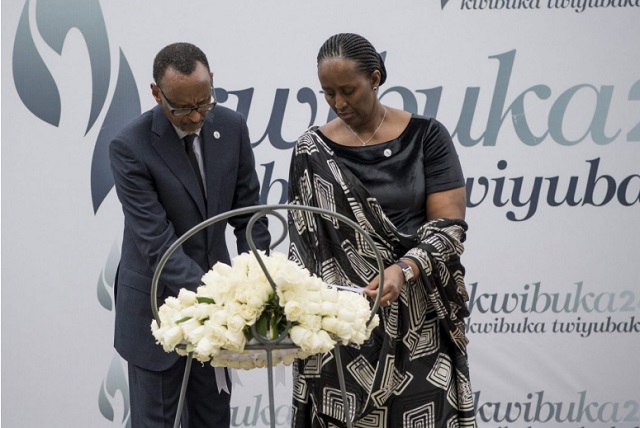
In Rwanda’s case, here was a man (Kagame) willing to impose harsh discipline on his lieutenants. They were willing to accept it because the alternative of living forever as refugees was not appealing to most of them
THE LAST WORD | ANDREW M MWENDA | Post genocide Rwanda is an intriguing and inspiring case study. Most of its circumstances would predict mediocre performance. It is small in geographic size and in population. It is landlocked and far away from the coast making its international trade difficult. It has two failed states as its neighbors – Burundi and DRC. It has a terrible history of Belgian colonialism that instigated sectarian schisms of the worst order. And it lacks that part of human capital (education and skills) that you find much more developed in countries like Kenya, Zimbabwe, Ghana and Nigeria.
Yet Rwanda has been outperforming its African peers in many aspects as measured by the rate of growth of GDP or by welfare outcomes such as life expectancy. And it is also able to provide its citizens with public infrastructure far above what its level of income (as measured by its per capita spending) would predict. I suspect Rwanda chanced upon four factors converging and then combining at the same time: history, culture, political struggles and leadership. These are a four-legged stool; if you remove one leg, it cannot stand with sufficient stability to hold the weight of anyone sitting on it.
Let us begin with culture and history. The most influential group in the leadership of post genocide Rwanda, to put it bluntly, is the Tutsi diaspora forming the core of RPF. The anxieties and aspirations of this group form the basis of Rwanda’s success. These Tutsi were born in exile, lived in refugee camps and were despised and discriminated against by their host countries. But they grew up listening to heroic stories of the greatness of their country (most of which were more myths than reality). So, they had a strong determination to return home and reclaim their citizenship.
I grew up on our family farm in Fort Portal with many of these Tutsi refugees keeping our cows. They would teach us (me and my siblings) Kinyarwanda songs, history and poetry most of which were of a revolutionary nature. They would tell us tall tales of heroic struggles waged by their parents and the coming struggles their generation had to carry out to win back their country and their citizenship. In some of the songs and poems, they included us as participants in their struggle, giving us imaginary names and roles and even honors for imaginary acts of courage.
These were ordinary illiterate peasants yet they were dreaming and mobilizing (at least psychologically) to return home. They cared after our cows as if they were their own, a dedication that I find in the way Rwandans tend of public lawns and flower gardens in cities and towns across the country. We identified with their dreams because we shared their pastoral culture but also because the way they constructed their story was inspiring. I suspect that this history and culture leading to their determination forms an important basis of their success once they returned home.
Yet when the RPF initially attacked Rwanda in October 1990, it was easily routed. This was in spite of it having the advantage of maximum tactical surprise, a large supply of weaponry, fighters with experience in war and the aforementioned revolutionary favor. When Paul Kagame retuned to take charge of RPF, he found it a defeated and demoralized organization: high hopes had turned into deep despair, morale had given way to resignation. This takes us back to our four-legged stool: the aforementioned advantages lacked the fourth leg of good leadership (or generalship) to stand firmly on the ground and carry the weight of responsibility before the RPF.
🔴 THE LAST WORD
A return to Rwanda#AndrewMwenda https://t.co/XOjS26EZAH
— The Independent (@UGIndependent) October 23, 2022
Here was the second moment for RPF. The legendary Fred Rwigyema was dead. The surviving officers had lost faith in their abilities to lead (or had realized their inadequacies) and were therefore humbled to be led. This undermined potential leadership wrangles, which allowed Kagame to gain effective control and command of the organization. Kagame’s personal leadership proved decisive. He is dogged, a tough disciplinarian and equally an effective manager. In a very short time, he turned a defeated and demoralized force into a highly motivated and effective fighting machine.
Where rebel movements take decades to win, RPF took only 3.5 years. This is the more remarkable because RPF lacked most of ingredients that facilitate successful insurgent movements. It did not enjoy popular support, it had no serious external backer in form of a super power, it had no access to a rich mineral from which it could rise funds to prosecute the war. However, these bad conditions were compensated by the determination of Tutsi refugees to go back home and regain their citizenship. Kagame once told me that more than 60% of the resources that prosecuted the war came from ordinary refugees in camps. Imagine that!
Here we see the continuous interplay between structure and agency, between the right material circumstances and the supply of good leadership. Right circumstances are necessary but not sufficient for success. They need agency i.e. good individual and organizational leadership. But the same applies to good leadership: without the right circumstances, it has little it can achieve. A country can have all the ingredients for success but fail to generate the right leadership. Here we see the role of luck in success. Equally, a country can have a good leader but structural obstacles prove obdurate.
In Rwanda’s case, here was a man (Kagame) willing to impose harsh discipline on his lieutenants. They were willing to accept it because the alternative of living forever as refugees was not appealing to most of them. In my next article I will return to the internal dynamics of the RPF struggle that ensured the evolution of an organization the vast majority of whose members were highly committed to its political objectives and were willing to subordinate personal ambitions to the collective good.
For now, we can say that in some other African countries, leaders such as Thomas Sankara, Kwame Nkrumah, Murtala Mohammed had high aspirations and the determination to pursue them. But at the local level, the elites whose privileges they sought to take away as part of reform, and the constituencies they could mobilize, were insurmountable. In Rwanda, the cost of failure seems to be very high, so its elites could not afford the luxury of incompetence. Yet because the supply of good leadership is rare even when conditions are right, Rwandans should never take Kagame’s role for granted: a bad leader could have led them to disaster, the more reason they should be more circumspect about a transition.
****
amwenda@independent.co.ug
 The Independent Uganda: You get the Truth we Pay the Price
The Independent Uganda: You get the Truth we Pay the Price




But Andrew Mwenda, stop worshiping cold-bloody criminals and glorifying violence through the application of euphemism such as “revolution” and “heroic struggles”. Otherwise, according to the law of remote, medium and immediate ripple cause and effect; how less disastrous was the 1994 Rwanda Genocide?
In a nutshell, after practicing it in Luweero Triangle and Northern Uganda; in their Tutsi hegemonic ambition, Gen Tibuhaburwa, Maj Rwegyema and Gen Kagame directly caused and inevitably triggered the 1994 Rwanda Genocide, which you now glorified as a “revolution and heroic struggles”.
In other words for the Andrew mwenda, Paul Kagame and Gen Tibuhaburwa of this Region, the end justifies the means. They do not give a damn about the mass loss of human lives and destruction properties as long as they get what they want.
Otherwise, the difference between a humane and good leader and the brutal and bad one is determined by the degree of harm he/she prevents (lives saved) and the degree of harm he/she causes (lives lost).
Mr. 0, you are really zero! You show off as an apologist for the 1994 genocide against the Rwandan Tutsis, with your cause-and-effect argument. Nothing can ever explain or justify the savagery of the pre-1994 Rwandan government, which, out of sheer incompetence, failed to stand up to the RPF rebellion, or overcome its backward policy of ethnic divisionism and respond adequately to the RPF’s legitimate demands, and instead preferred to wipe out Tutsi civilians because of who they were. The three men you belittle and insult are the heroes of our two countries, indeed of the entire sub-region.
But Ntare, what is it in your logic that the savages did not stand up to the RPF?
In other words, you are admitting that the ones who kills the most are the ones who win the war. Therefore the number (800,000+) of the 1994 Genocide victims were afterall not the Tutsi (victors), but the Hutu (you continue to vulgarize as savages).
This score card tells it all.A genocide, two failed states in the neighbourhood, more fragile and not so friendly sister states like Uganda,South Sudan,CAR,Somalia and Ethiopia. You can see that it pays to be your brother’s keeper. So far Rwanda has failed in this.
It is no brained that a failed state will easily recover if it has stable prosperous neighbours and a blot of success in a sea of failed enterprises is not a good reason for celebration.
The misadventures of these pseudo a revolutionaries has made the region a favourite destination for arms merchants. It is much easier to start a rebel outfit just like you did in Kanyendahi than to start a business and as usual the decadent leaders in this mess will go on to boast of the numerous rebellions they have defeated. This iis a midst a populace that can barely afford a decent meal.
Thank you
A very good article Mr. Mwenda. Rwanda is indeed a good case study in governance and economic turnaround after national disaster.
BS